-
 Bitcoin
Bitcoin $108,017.2353
-0.81% -
 Ethereum
Ethereum $2,512.4118
-1.58% -
 Tether USDt
Tether USDt $1.0002
-0.03% -
 XRP
XRP $2.2174
-1.03% -
 BNB
BNB $654.8304
-0.79% -
 Solana
Solana $147.9384
-1.76% -
 USDC
USDC $1.0000
-0.01% -
 TRON
TRON $0.2841
-0.76% -
 Dogecoin
Dogecoin $0.1636
-2.09% -
 Cardano
Cardano $0.5726
-1.72% -
 Hyperliquid
Hyperliquid $39.1934
1.09% -
 Sui
Sui $2.9091
-0.59% -
 Bitcoin Cash
Bitcoin Cash $482.1305
0.00% -
 Chainlink
Chainlink $13.1729
-1.54% -
 UNUS SED LEO
UNUS SED LEO $9.0243
-0.18% -
 Avalanche
Avalanche $17.8018
-1.90% -
 Stellar
Stellar $0.2363
-1.69% -
 Toncoin
Toncoin $2.7388
-3.03% -
 Shiba Inu
Shiba Inu $0.0...01141
-1.71% -
 Litecoin
Litecoin $86.3646
-1.98% -
 Hedera
Hedera $0.1546
-0.80% -
 Monero
Monero $311.8554
-1.96% -
 Dai
Dai $1.0000
-0.01% -
 Polkadot
Polkadot $3.3473
-2.69% -
 Ethena USDe
Ethena USDe $1.0001
-0.01% -
 Bitget Token
Bitget Token $4.3982
-1.56% -
 Uniswap
Uniswap $6.9541
-5.35% -
 Aave
Aave $271.7716
0.96% -
 Pepe
Pepe $0.0...09662
-1.44% -
 Pi
Pi $0.4609
-4.93%
Dogecoin moving average ribbon strategy
The Dogecoin moving average ribbon strategy uses multiple EMAs to spot trends and reversals, helping traders time entries and exits based on price momentum and ribbon expansion or contraction.
Jul 05, 2025 at 07:32 pm
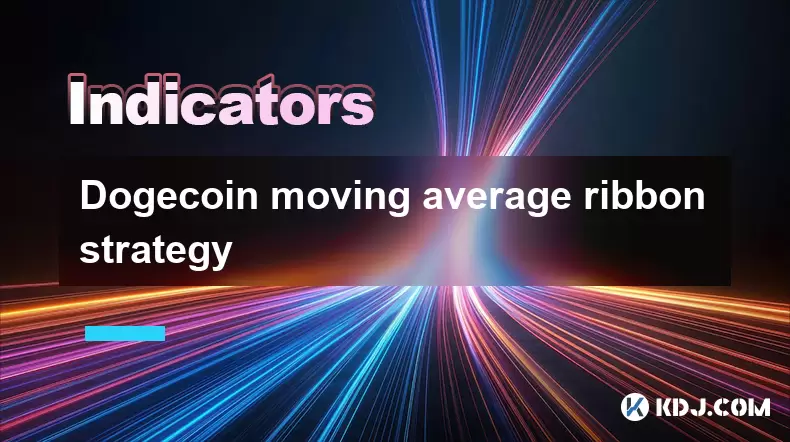
What is the Dogecoin Moving Average Ribbon Strategy?
The Dogecoin moving average ribbon strategy is a technical analysis approach used by traders to identify potential trends and reversals in the price of DOGE. This method involves plotting multiple moving averages (MAs) on a price chart, typically of varying lengths, which visually form a "ribbon" when aligned closely together. When these moving averages converge or diverge, it can signal changes in market momentum.
Traders apply this strategy across different timeframes—daily, weekly, or even hourly charts—to assess both short-term fluctuations and long-term trends. The ribbon effect becomes more pronounced when using exponential moving averages (EMAs), as they respond faster to recent price changes compared to simple moving averages (SMAs).
How to Set Up the Moving Average Ribbon for Dogecoin
To implement the Dogecoin moving average ribbon strategy effectively, you must first configure your chart with the correct set of moving averages. A common setup includes:
- EMA 8
- EMA 13
- EMA 21
- EMA 34
- EMA 55
- EMA 89
- EMA 144
- EMA 233
Each of these EMAs should be plotted on the same chart with distinct colors for clarity. When all EMAs are tightly grouped together, it indicates a consolidation phase or low volatility. Conversely, when the lines fan out, it suggests a strong trend either upward or downward.
Most trading platforms like TradingView, Binance Trading Interface, or MetaTrader allow users to add multiple EMAs manually or through built-in indicators. Ensure that the timeframe selected matches your trading goals—day traders may use 1-hour or 4-hour charts, while swing traders often rely on daily charts.
Identifying Bullish Signals Using the Ribbon
A bullish signal occurs when the Dogecoin price begins to rise and the moving average ribbon starts to expand upwards. This expansion shows increasing positive momentum. Key conditions to look for include:
- Price crossing above all EMAs
- Ribbon lines turning from flat to upward-sloping
- Green candles forming consistently above the ribbon
In such scenarios, traders might consider entering long positions after confirming the breakout with volume spikes. It's crucial to wait for at least two consecutive candlesticks closing above the ribbon before taking action to avoid false signals.
Additionally, traders can use other tools like Relative Strength Index (RSI) or MACD to confirm that the asset isn't overbought and that momentum supports the bullish move.
Recognizing Bearish Trends Through the Ribbon
When the Dogecoin price starts declining, the moving average ribbon compresses and then fans downward, signaling a bearish trend. Important signs of a downtrend include:
- Price dropping below the entire MA ribbon
- Ribbon lines flattening or pointing downward
- Red candles appearing consistently beneath the ribbon
In such situations, traders might initiate short positions or exit existing long trades. It’s essential to monitor support levels and watch for any sudden buying pressure that could reverse the trend.
Setting stop-loss orders just above the most recent high or the top of the ribbon helps manage risk during bearish phases. Also, volume confirmation is vital—falling prices with rising volume indicate stronger selling pressure.
Adjusting the Strategy Based on Market Conditions
Market conditions can significantly impact the effectiveness of the Dogecoin moving average ribbon strategy. During high volatility periods, the ribbon may produce more false signals due to erratic price swings. In contrast, during low volatility or sideways markets, the ribbon tends to contract, making it harder to identify clear trends.
To adapt:
- Use wider timeframes during volatile periods to filter noise
- Combine the ribbon with support/resistance levels
- Add volume filters to validate breakouts
Some traders also adjust the EMA settings depending on how reactive they want the indicator to be. For instance, shorter EMAs like EMA 5, 10, 20 can provide quicker signals but may generate more whipsaws.
Frequently Asked Questions (FAQ)
Q: Can I use the Dogecoin moving average ribbon strategy on any trading platform?
Yes, most major platforms such as TradingView, Binance, KuCoin, and MetaTrader allow customization of multiple EMAs, enabling you to create the ribbon manually or via custom scripts.
Q: Is the ribbon strategy suitable for beginners?
While the concept is straightforward, interpreting the ribbon effectively requires experience. Beginners should practice on demo accounts and combine this tool with basic education on trendlines and candlestick patterns.
Q: Do I have to use only EMAs, or can I mix SMAs and EMAs?
You can experiment with combinations, but keep in mind that mixing SMAs and EMAs might reduce responsiveness. Most traders prefer using all EMAs for consistency and quicker reaction times.
Q: How many moving averages should I include in my ribbon for Dogecoin trading?
Typically, between 7 to 9 MAs are used to create a reliable ribbon. Too few may not offer enough detail, while too many can clutter the chart and slow down data processing.
Disclaimer:info@kdj.com
The information provided is not trading advice. kdj.com does not assume any responsibility for any investments made based on the information provided in this article. Cryptocurrencies are highly volatile and it is highly recommended that you invest with caution after thorough research!
If you believe that the content used on this website infringes your copyright, please contact us immediately (info@kdj.com) and we will delete it promptly.
- Cryptos in July 2025: Massive Gains or Just Hype?
- 2025-07-05 20:30:13
- Pepe's EVM Layer 2 Meme Coin Mania: What's the Hype?
- 2025-07-05 20:50:12
- Shiba Inu, Dogecoin, and the Crypto Skyrocket: What's Making These Memes Soar?
- 2025-07-05 21:10:12
- Tokenized Stocks: Robinhood, Gemini, and the NYSE Threat
- 2025-07-05 21:10:12
- Altcoin Adventures: Navigating the Pepe Fork Frenzy and Solana's Summer Swings
- 2025-07-05 21:15:12
- Hong Kong's Tokenised Bond Leap: Zero Stamp Duty Sparks Web3 Ambitions
- 2025-07-05 20:30:13
Related knowledge
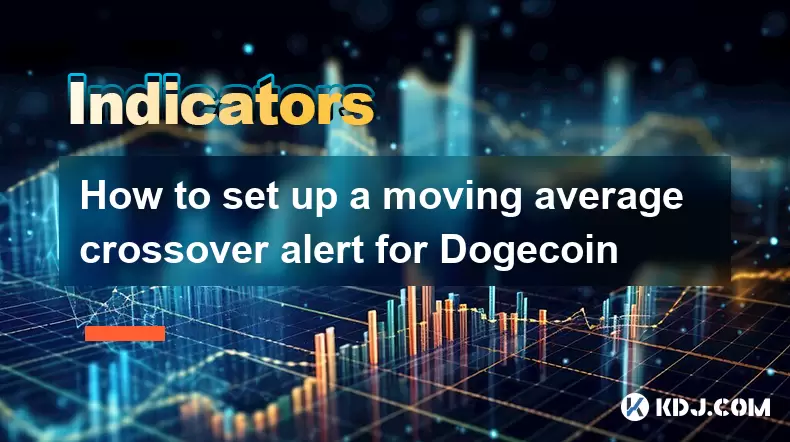
How to set up a moving average crossover alert for Dogecoin
Jul 05,2025 at 07:33pm
Understanding Moving Averages and Their Relevance to DogecoinMoving averages (MAs) are among the most commonly used technical indicators in cryptocurrency trading. They help smooth out price data over a specific time period, offering traders a clearer view of trends. Dogecoin, being a highly volatile altcoin, often exhibits strong momentum when certain ...

Dogecoin moving average ribbon strategy
Jul 05,2025 at 07:32pm
What is the Dogecoin Moving Average Ribbon Strategy?The Dogecoin moving average ribbon strategy is a technical analysis approach used by traders to identify potential trends and reversals in the price of DOGE. This method involves plotting multiple moving averages (MAs) on a price chart, typically of varying lengths, which visually form a 'ribbon' when ...
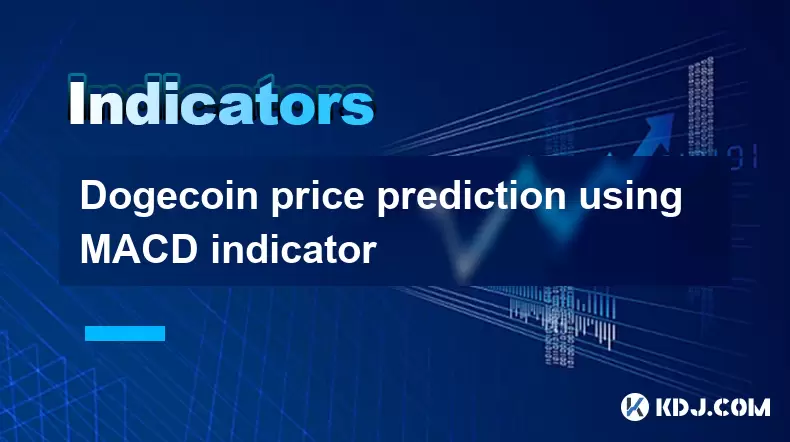
Dogecoin price prediction using MACD indicator
Jul 05,2025 at 07:18pm
Understanding the MACD Indicator in Cryptocurrency TradingThe Moving Average Convergence Divergence (MACD) is a popular technical analysis tool used by traders to identify potential price trends and reversals. It consists of three main components: the MACD line, the signal line, and the MACD histogram. The MACD line is calculated by subtracting the 26-p...
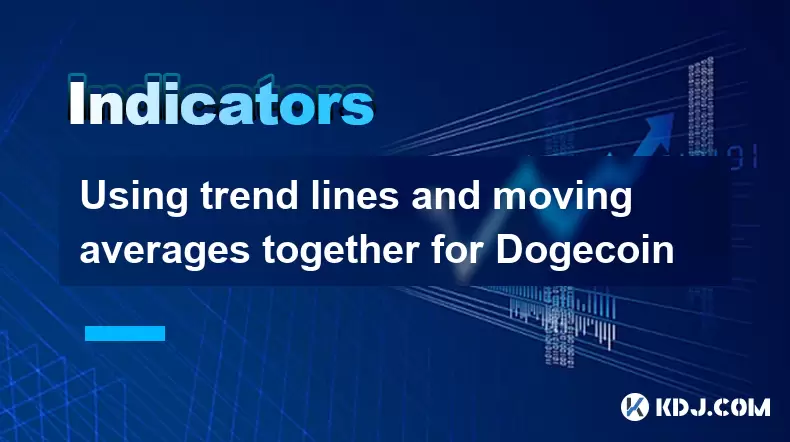
Using trend lines and moving averages together for Dogecoin
Jul 05,2025 at 07:16pm
Understanding Trend Lines in Cryptocurrency TradingTrend lines are essential tools for analyzing price movements in the cryptocurrency market. In Dogecoin trading, trend lines help identify potential support and resistance levels by connecting significant price points on a chart. When applied correctly, these lines can indicate whether the asset is in a...
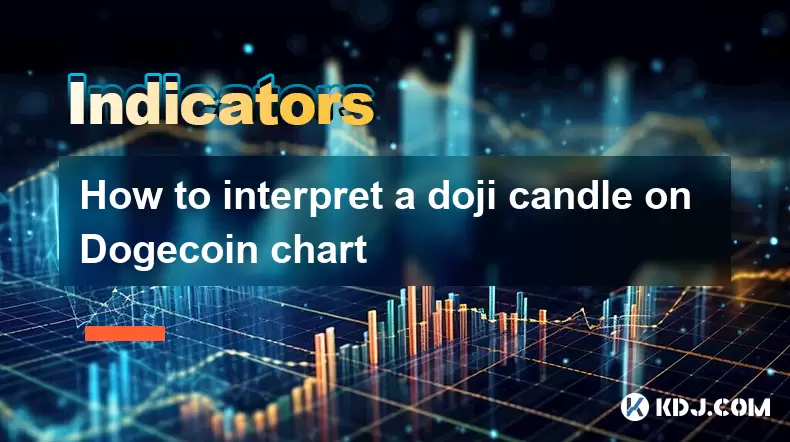
How to interpret a doji candle on Dogecoin chart
Jul 05,2025 at 07:49pm
Understanding the Doji Candlestick PatternA doji candle is a crucial technical indicator in cryptocurrency trading, especially when analyzing assets like Dogecoin. It represents market indecision and often signals potential reversals or continuation patterns. A doji forms when the opening and closing prices of an asset are nearly identical, resulting in...
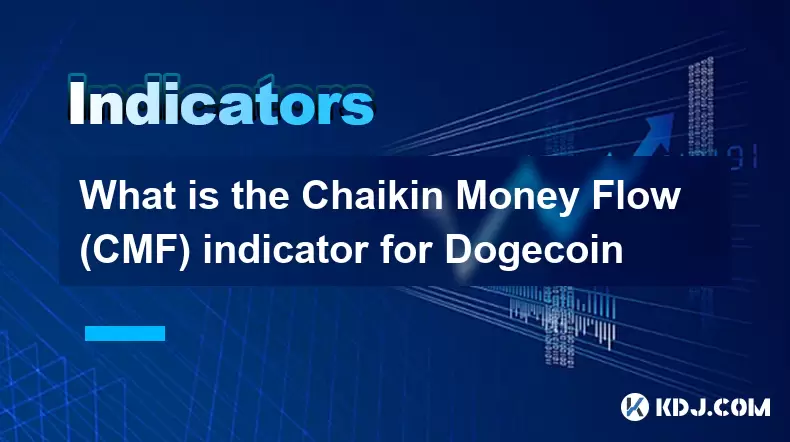
What is the Chaikin Money Flow (CMF) indicator for Dogecoin
Jul 05,2025 at 07:32pm
Understanding the Chaikin Money Flow (CMF) IndicatorThe Chaikin Money Flow (CMF) is a technical analysis indicator developed by Marc Chaikin to measure the accumulation and distribution of a financial asset over a specific period. It combines both price and volume data to assess whether institutional investors are actively buying or selling an asset. In...

How to set up a moving average crossover alert for Dogecoin
Jul 05,2025 at 07:33pm
Understanding Moving Averages and Their Relevance to DogecoinMoving averages (MAs) are among the most commonly used technical indicators in cryptocurrency trading. They help smooth out price data over a specific time period, offering traders a clearer view of trends. Dogecoin, being a highly volatile altcoin, often exhibits strong momentum when certain ...

Dogecoin moving average ribbon strategy
Jul 05,2025 at 07:32pm
What is the Dogecoin Moving Average Ribbon Strategy?The Dogecoin moving average ribbon strategy is a technical analysis approach used by traders to identify potential trends and reversals in the price of DOGE. This method involves plotting multiple moving averages (MAs) on a price chart, typically of varying lengths, which visually form a 'ribbon' when ...

Dogecoin price prediction using MACD indicator
Jul 05,2025 at 07:18pm
Understanding the MACD Indicator in Cryptocurrency TradingThe Moving Average Convergence Divergence (MACD) is a popular technical analysis tool used by traders to identify potential price trends and reversals. It consists of three main components: the MACD line, the signal line, and the MACD histogram. The MACD line is calculated by subtracting the 26-p...

Using trend lines and moving averages together for Dogecoin
Jul 05,2025 at 07:16pm
Understanding Trend Lines in Cryptocurrency TradingTrend lines are essential tools for analyzing price movements in the cryptocurrency market. In Dogecoin trading, trend lines help identify potential support and resistance levels by connecting significant price points on a chart. When applied correctly, these lines can indicate whether the asset is in a...

How to interpret a doji candle on Dogecoin chart
Jul 05,2025 at 07:49pm
Understanding the Doji Candlestick PatternA doji candle is a crucial technical indicator in cryptocurrency trading, especially when analyzing assets like Dogecoin. It represents market indecision and often signals potential reversals or continuation patterns. A doji forms when the opening and closing prices of an asset are nearly identical, resulting in...

What is the Chaikin Money Flow (CMF) indicator for Dogecoin
Jul 05,2025 at 07:32pm
Understanding the Chaikin Money Flow (CMF) IndicatorThe Chaikin Money Flow (CMF) is a technical analysis indicator developed by Marc Chaikin to measure the accumulation and distribution of a financial asset over a specific period. It combines both price and volume data to assess whether institutional investors are actively buying or selling an asset. In...
See all articles

























































































